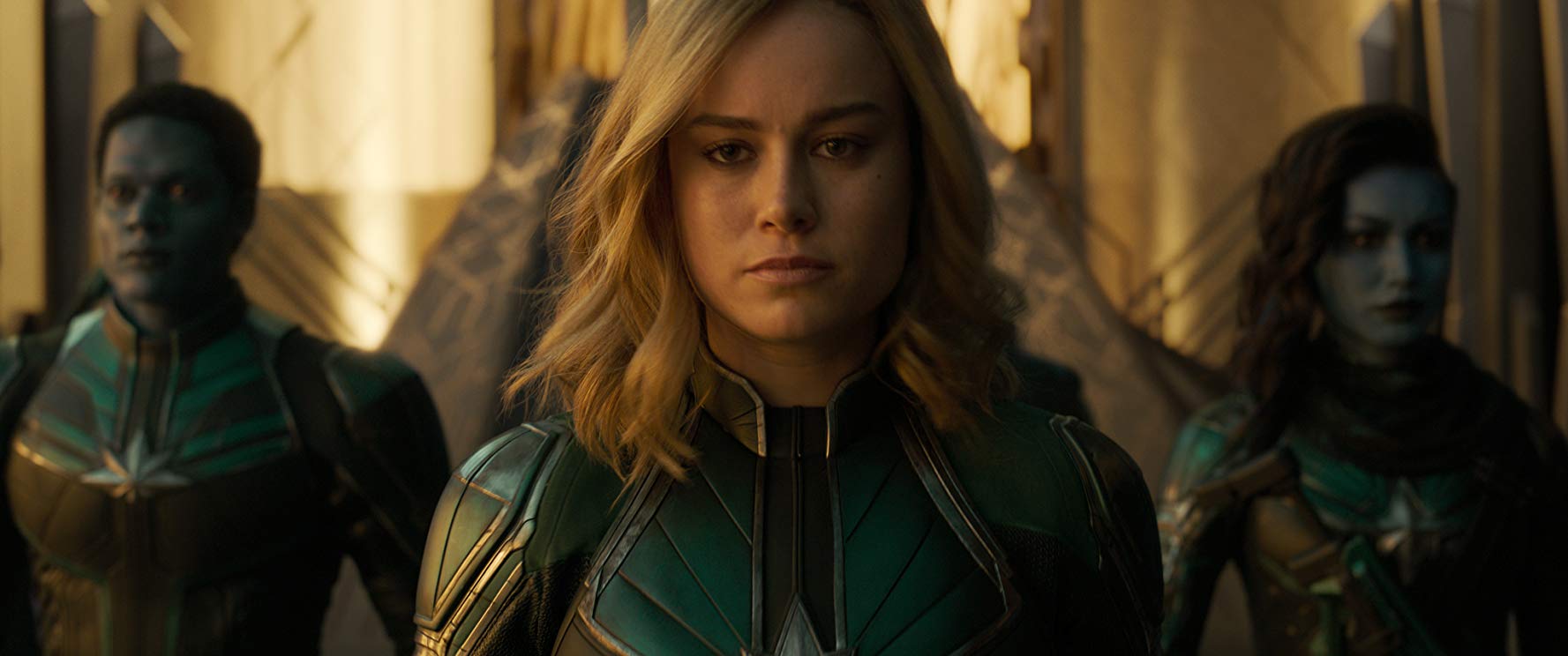Who is Captain Marvel? A complete history of The Avengers' all-powerful super woman.
Here's everything you need to know about The Avengers' new mega-hero.


A free daily email with the biggest news stories of the day – and the best features from TheWeek.com
You are now subscribed
Your newsletter sign-up was successful
The latest movie from the mega-successful, multi-billion-dollar-grossing "Marvel Cinematic Universe" is Captain Marvel, due to hit theaters on March 8. Brie Larson plays the hero: a human-alien hybrid who channels the energy of the stars to give her the power of flight, super-strength, phenomenal endurance, and a heightened awareness of danger.
Captain Marvel isn't as well-known in popular culture as Marvel Comics characters like Spider-Man, Wolverine, Iron Man, and the Hulk. But as Marvel Studios has proven with the likes of Guardians of the Galaxy, Ant-Man, and Black Panther, even its more obscure heroes can go mainstream.
What's tricky about Captain Marvel is that the character has gone through so many changes over the decades, since being introduced in the late 1960s. It's not essential to know any of the history before seeing the film, but it might help foster a larger appreciation for this fascinating, multifaceted superhero franchise.
The Week
Escape your echo chamber. Get the facts behind the news, plus analysis from multiple perspectives.

Sign up for The Week's Free Newsletters
From our morning news briefing to a weekly Good News Newsletter, get the best of The Week delivered directly to your inbox.
From our morning news briefing to a weekly Good News Newsletter, get the best of The Week delivered directly to your inbox.
Here are the basics:
Who's the movie version of Captain Marvel?
Larson is playing Carol Danvers, a Marvel Comics character first introduced in non-powered, purely human form in Marvel Super-Heroes #13, in 1968. A U.S. Air Force officer and security liaison, Danvers popped up as a supporting player in several late '60s comic book stories. Then she suffered a freaky accident — as so many Marvel characters do — which fused her genetic structure with an alien warrior from the Kree race.
The super-powered Danvers debuted in 1977, and spent a few years as a member of the Avengers before a capricious, godlike alien named Marcus brainwashed her and spirited her away to an alternate dimension. Almost as soon as she returned, she had her powers and memories stolen by a troubled mutant known as Rogue.
A free daily email with the biggest news stories of the day – and the best features from TheWeek.com
In the decades that followed, Carol dealt with mental and emotional problems, stemming from those two traumas. She also got new powers, and operated under the names "Binary" and "Warbird." In recent years, the comic book Danvers has reverted to something more like her original superhero form, as Captain Marvel: an ace pilot and galaxy-hopping champion of the downtrodden.
The Captain Marvel movie reportedly goes back to the early days of the character — though it updates the action to the '90s, rather than the '60s and '70s. The big-screen Carol Danvers will have the military background, and the Kree connection; and will also be suffering from amnesia when the story begins, similar to what the comic book version endured in the '80s. The film will also draw from one of the classic 1970s Marvel storylines: When Earth got caught in the middle of an ancient war between the Kree and the shape-shifting alien race the Skrulls.

Is Carol Danvers the first Captain Marvel?
No, that honor goes to an actual Kree warrior, known by his people as Mar-Vell, introduced in 1967 in Marvel Super-Heroes #12. Originally tasked with infiltrating Earth's culture for nefarious purposes, Mar-Vell quickly developed warm feelings toward the human race (including his new friend Carol Danvers) and became a hero, often helping his adopted planet fend off other hostile aliens.
This Captain Marvel character plays a key role in several of the publisher's more epic '70s storylines, including the Kree-Skrull War. As written and drawn by the iconoclastic comic book creator Jim Starlin, some of Captain Marvel's stories would become central to the superhero comics genre's evolution toward ambitious adult fantasy. In fact, in 1982, Starlin was responsible for the first "Marvel Graphic Novel," The Death of Captain Marvel, which combines cosmic adventure with the more down-to-Earth story of a hero dying of cancer.
Will Mar-Vell appear in the movie? No one at Marvel Studios will say ... which means the answer is probably "yes."
Who is Ms. Marvel?
Carol Danvers' first superhero identity (in the comics, anyway) was as "Ms. Marvel," because in 1977, the other Captain Marvel was still alive. Despite her skimpy costume, the original Ms. Marvel was proudly feminist, as fierce and capable as any man, with a name meant to evoke Gloria Steinem's Ms. magazine.
That's why it was so controversial when Danvers was abducted by Marcus and briefly written out of The Avengers, circa 1980. The critic Carol Strickland wrote a widely discussed essay back then about how appalling this plot development was, in one of the first major examples of the female fanbase pushing back against the way a male-dominated comics industry wrote and drew women.
Recent writers have returned Carol Danvers and Ms. Marvel to their women's rights roots. When Kelly Sue DeConnick started writing Danvers as Captain Marvel in 2012, she put more focus on her military background and take-no-guff attitude. Writer G. Willow Wilson (working with artist Adrian Alphona and editors Sana Amanat and Stephen Wacker) garnered glowing headlines in the mainstream press in 2013 when they created a new Ms. Marvel: a Pakistani-American teenager named Kamala Khan, the first Muslim to be the lead character in a Marvel comic.
How many Captain Marvels have there been?
So, so many. From 1967 to '77, the only Captain Marvel in Marvel Comics was Mar-Vell; and then Carol Danvers became Ms. Marvel. But in 1981 Ms. Marvel was robbed of her powers; and in '82, the original Captain Marvel died. Since then, nearly a dozen ongoing comic book characters have adopted the title of Captain Marvel or Ms. Marvel.
For much of the '80s, Captain Marvel was a New Orleans-based black woman named Monica Rambeau. Then Mar-Vell's children — a son, Genis-Vell, and a daughter, Phyla-Vell — took their own turns zipping through the stars. Also in the '80s, between the Carol Danvers and Kamala Khan era, a wrestler named Sharon Ventura fought crime as Ms. Marvel. And then there are all the alternate universes and short-lived variant versions.
Regardless of who's wearing the costumes though, there are two recurring themes attached to the Captain Marvel/Ms. Marvel names: a tendency toward big, interplanetary sagas; and an emphasis on strong women.
Which is the one who says "Shazam!"?
That's… complicated.
In 1940, Fawcett Comics and the writer-artist team of Bill Parker and C.C. Beck created the orphan newsboy character Billy Batson, who says the magic word "Shazam" whenever he's in trouble and is replaced on Earth by a costumed he-man with the combined gifts of Solomon, Hercules, Atlas, Zeus, Achilles, and Mercury.
This Captain Marvel (who, coincidentally, is getting his own movie this April) was a big deal in the '40s, but was effectively sued out of existence by DC Comics in 1953, during an era when the Superman-owning company's lawyers took action against just about any super-strong super-hero in a cape. DC itself revived the character in the '70s, but by then, Marvel was the biggest publisher in the industry, and their lawyers kept DC from titling its new Shazam! comic Captain Marvel.
One reason why Marvel keeps publishing Captain Marvel comics even when the character wanes in popularity is to keep the name alive in the market, to block the competition. (This is where I could talk at length about the British comic book series Marvelman, which in the U.S. had to be retitled Miracleman, and ... well, it's hard to explain what happened next. Just Google it.)
Here's what's really strange: In the early '70s, the Mar-Vell version of Captain Marvel formed a metaphysical bond with a young Earth man, Rick Jones ... very similar to the connection between Billy Batson and Shazam. So Marvel Comics didn't just secure the Captain Marvel name, they sort of stole the whole premise.
What does all this have to do with the Avengers movie?
Since last April's Avengers: Infinity War ended with the super-villain Thanos eradicating half of all the living creatures in the universe, Marvel movie buffs are probably a little anxious about having to wait so long to find out what happened to Spider-Man, Doctor Strange, Black Panther, and the rest.
But maybe Captain Marvel will also be about all that, in a roundabout way? The movie's set in the '90s, true. But in the '70s comics, Thanos was one of Mar-Vell's major recurring villains; and in recent years, the comic book Carol Danvers has frequently crossed paths with the Avengers and the Guardians of the Galaxy. Plus, we already know that one of the film's major characters will be a younger Nick Fury, a couple of decades before launching his "Avengers Initiative."
There's a good chance that Captain Marvel will be a relevant interlude between Infinity War and this April's follow-up Endgame: a sort of belated prequel to the entire Marvel movie series.
And if not? Just having this character break out beyond the comic book page is reason enough for the film to exist.
Noel Murray is a freelance writer, living in Arkansas with his wife and two kids. He was one of the co-founders of the late, lamented movie/culture website The Dissolve, and his articles about film, TV, music, and comics currently appear regularly in The A.V. Club, Rolling Stone, Vulture, The Los Angeles Times, and The New York Times.
-
 How the FCC’s ‘equal time’ rule works
How the FCC’s ‘equal time’ rule worksIn the Spotlight The law is at the heart of the Colbert-CBS conflict
-
 What is the endgame in the DHS shutdown?
What is the endgame in the DHS shutdown?Today’s Big Question Democrats want to rein in ICE’s immigration crackdown
-
 ‘Poor time management isn’t just an inconvenience’
‘Poor time management isn’t just an inconvenience’Instant Opinion Opinion, comment and editorials of the day
-
 Walter Isaacson's 'Elon Musk' can 'scarcely contain its subject'
Walter Isaacson's 'Elon Musk' can 'scarcely contain its subject'The latest biography on the elusive tech mogul is causing a stir among critics
-
 Welcome to the new TheWeek.com!
Welcome to the new TheWeek.com!The Explainer Please allow us to reintroduce ourselves
-
 The Oscars finale was a heartless disaster
The Oscars finale was a heartless disasterThe Explainer A calculated attempt at emotional manipulation goes very wrong
-
 Most awkward awards show ever?
Most awkward awards show ever?The Explainer The best, worst, and most shocking moments from a chaotic Golden Globes
-
 The possible silver lining to the Warner Bros. deal
The possible silver lining to the Warner Bros. dealThe Explainer Could what's terrible for theaters be good for creators?
-
 Jeffrey Wright is the new 'narrator voice'
Jeffrey Wright is the new 'narrator voice'The Explainer Move over, Sam Elliott and Morgan Freeman
-
 This week's literary events are the biggest award shows of 2020
This week's literary events are the biggest award shows of 2020feature So long, Oscar. Hello, Booker.
-
 What She Dies Tomorrow can teach us about our unshakable obsession with mortality
What She Dies Tomorrow can teach us about our unshakable obsession with mortalityThe Explainer This film isn't about the pandemic. But it can help viewers confront their fears about death.
